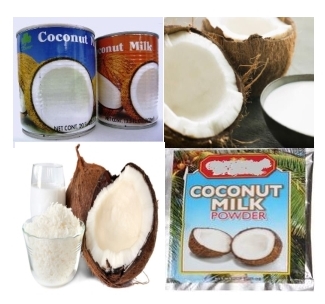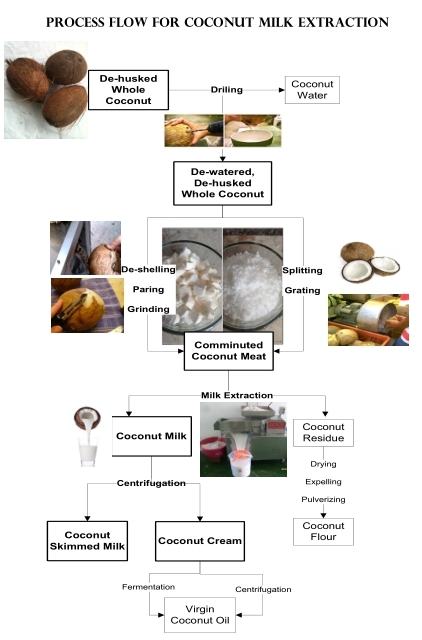Coconut milk is the liquid obtained by manual or mechanical extraction of comminuted coconut meat, with or without water. The composition of coconut milk depends on the amount of water used for the extraction, affecting significantly moisture and fat content.

Coconut milk obtained from single-stage extraction, without added water, is called ‘ K akang Gata ’ .
Freshly extracted coconut milk has a pH of 6 ( slightly acidic ) and coagulates when heated to 80°C.
Coconut milk is rich in proteins such as albumin, globulin, prolamin and glutein Emulsifying agents help in increasing dispersibility and stability of food emulsions; examples of such are phospholipids, cephalin and lecithin which have been found in coconut milk.

Basic Equipment Used:
1. Deshelling Machine: for removal of the coconut shell
2. Grinder/ Pulverizer: pared, quartered coconut meat is reduced in particle size by grinding, for a more efficient milk extraction
3. Grater: motorized coconut shredder after coconut is split into halves
4. Coconut Milk Extractor: for mechanical extraction of coconut milk from the comminuted coconut meat
COCONUT MILK and Its Processing
Bottling or Canning
Filtration: the extracted coconut milk is filtered using a vibro screen with a stainless filter of 100 mesh or finer
Pasteurization: filtered coconut milk is pasteurized indirectly by double boiling at 70°C for 15minutes
Packaging: once pasteurization temperature is achieved, the coconut milk is removed from the heat source, immediately transferred to stainless steel filling vessels hot-filled in appropriate containers and sealed
Cooling: packed coconut milk is immersed in a cooling tank water bath to bring down the temperature.
Storage: coconut milk packed in plastic bottles or pouches is subjected to blast freezing and transferred to freezers for cold storage; while canned coconut milk undergo sterilization, they remain stable at ambient storage after cooling.
Dehydration or Spray-Drying
Dehydration of coconut milk into a powdered product renders stability, convenience and increased consumption while keeping its natural quality, flavor and texture upon rehydration.
Blending: minimal amounts of maltodextrin and casein are blended into fresh coconut cream to improve fluidity
Spray-Drying: blended cream is spray dried
Packaging: resulting powder is packaged in moisture-vapor-proof container
Coconut Milk and Cream
Coconut Milk products are prepared using a significant amount of comminuted coconut meat and expelled, where most filterable fibers and residues are excluded, with or without coconut water, and/or with additional water, thermally processed appropriately and sealed in a container to prevent spoilage.
Product Styles
1. Light Coconut Milk The product obtained from either the bottom portion of centrifuged coconut milk or by further dilution of coconut milk
2. Coconut Milk The dilute emulsion of comminuted coconut meat in water with soluble and suspended solids
3. Coconut Cream The emulsion extracted from matured coconut meat with or without the addition of coconut water/water
4. Coconut Cream Concentrate The product obtained after the partial removal of water from coconut cream
Simulated dairy milk beverage derived from Coconut Milk
Simulated dairy milk beverage are dairy milk substitutes formulated to contain approximately those of their dairy milk counterparts. The local milk industry utilizes coconut milk which is a rich source of vegetable fat to substitute for imported butterfat. Coconut milk is a cheaper source, contains natural emulsifiers and much easier to blend with skim milk.
Milk Substitute Preparations
1. Low Fat Coconut Filled Milk Reconstituted skimmed milk with stabilizer is blended and homogenized with coconut milk
2. Evaporated Reconstituted Milk Reconstituted skimmed milk with stabilizer is blended and with coconut milk, heated under reduced pressure until it has lost about half its water.
3. Sweetened Condensed Milk Concentrated evaporated reconstituted milk is added with sugar to give a total sugar concentration of about 55%.
FOOD PRODUCT DEVELOPMENT DIVISION
Research and Development Branch Philippine Coconut Authority FPDD Plant, PCA Cmpd., Elliptical Road Diliman, Quezon City Tel. No.: (+632 ) 928-4501 Fax No.: (+632 ) 926-7631 Email: fpdd.pca@gmail.com
Source: Philippine Coconut Authority
